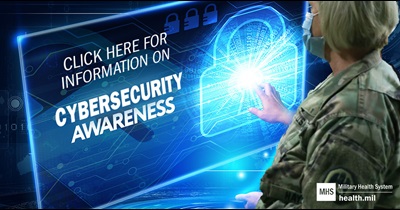Skip subpage navigation
Defense Health Agency Information Operations is consolidating and standardizing solutions and infrastructure to enhance and simplify health care information technology for users across the Military Health System. Our goal is to deliver seamless health IT solutions to support the delivery of health care to 9.6 million beneficiaries worldwide and give our workforce solutions to do their jobs more efficiently.
What is Health Care Technology?
Health care technology is any technology, including medical devices, IT systems, algorithms, artificial intelligence, and more designed to support health care organizations.
Benefits of Technology in Health Care
Improved Patient Care and Experience
We use technology to measure and capture data across the entire MHS to see how we’re performing and make improvements to clinical care and our patients’ experience. >>More
Real-Time Information Exchange
We’re deploying a new electronic health record, and when fully deployed, MHS GENESIS will provide a single, secure and integrated health record for service members, veterans and their families. >>More
Flexible Health Care Options
We're all busy, but with telehealth solutions, we're meeting you where you are to give you the care you need. >>More

You also may be interested in...
Fact Sheet
Feb 16, 2021
 .PDF |
499.15 KB
.PDF |
499.15 KB
This fact sheet provides an overview of key themes in ethics related to the use of digital health in clinical practice.
Fact Sheet
Feb 16, 2021
 .PDF |
365.27 KB
.PDF |
365.27 KB
Tips and techniques for maintaining privacy and security of health information stored on mobile devices.
Article
Feb 12, 2021
DHA IT Teams Deliver Innovative Solutions During Pandemic.
Article
Feb 2, 2021
Early detection of infectious diseases in the field to protect the troops.
Fact Sheet
Jan 21, 2021
The mission of Solution Delivery Division (SDD) is enhancing Health Service Delivery through exceptional Information and Technology.
Article
Jan 14, 2021
Jamie Adler, the lead for the DHA’s Virtual Health Clinical Integration Office, discusses the future of virtual health (VH).
Article
Jan 5, 2021
MHS innovations in 2020 include a new registry for real-time COVID-19 data and a system to free up hospital beds and protect patients from the disease.
Article
Dec 31, 2020
IT innovations keep pace despite COVID-19 road blocks.
Article
Dec 29, 2020
COVID MTF innovations include more virtual health options and drive thrus.
Publication
Sep 22, 2020
 .PDF |
300.34 KB
.PDF |
300.34 KB
Document that describes the technology readiness level of an agency
Publication
Sep 17, 2020
 .PDF |
1.22 MB
.PDF |
1.22 MB
Overview of the digital health resources and tools available from the Defense Health Agency supporting provider resilience.
Publication
Sep 17, 2020
 .PPTX |
750.84 KB
.PPTX |
750.84 KB
Tips and recommendations for health care providers on self-care to promote resilience and reduce stress.
Article
Aug 18, 2020
Open-source EHR proves worth in Coalition Warrior Interoperability Exercise
Publication
Aug 6, 2020
 .JPG |
363.43 KB
.JPG |
363.43 KB
This infographic outlines three primary steps in supporting self care and resilience in health care providers.
Publication
Jun 19, 2020
 .PDF |
246.05 KB
.PDF |
246.05 KB
Review of the myths and facts on the use of virtual health technology to deliver health care.
You are leaving Health.mil
The appearance of hyperlinks does not constitute endorsement by the Department of Defense of non-U.S. Government sites or the information, products, or services contained therein. Although the Defense Health Agency may or may not use these sites as additional distribution channels for Department of Defense information, it does not exercise editorial control over all of the information that you may find at these locations. Such links are provided consistent with the stated purpose of this website.
You are leaving Health.mil
View the external links disclaimer.
Last Updated: July 09, 2024